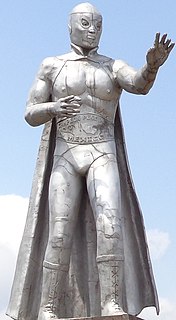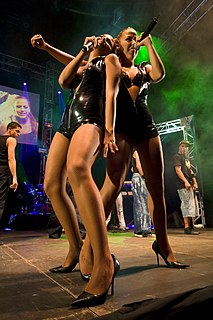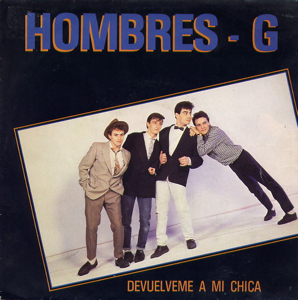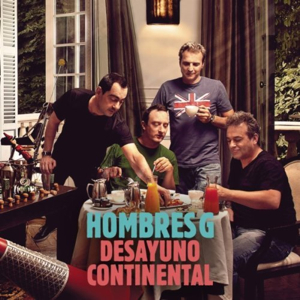| Look up hombres in Wiktionary, the free dictionary. |
Hombres, the plural of Hombre and sometimes used informally in English, may refer to:
| Look up hombres in Wiktionary, the free dictionary. |
Hombres, the plural of Hombre and sometimes used informally in English, may refer to:
| This disambiguation page lists articles associated with the title Hombres. If an internal link led you here, you may wish to change the link to point directly to the intended article. |

Enanitos Verdes is a rock trio from Argentina, formed in 1979 in the city of Mendoza.
Diablo[ˈdjaβlo] is a Spanish word meaning "Devil".

Hombres G is a Spanish pop rock band, formed in Spain in 1983. They are widely considered one of Spain's most prominent pop groups of the 1980s and early 1990s. The band consists of David Summers, Rafael Gutierrez (guitar), Dani Mezquita (guitar), and Javi Molina (drums).

Rodolfo Guzmán Huerta, more widely known as El Santo, or in English The Saint, was a Mexican Luchador enmascarado, film actor, and folk hero. El Santo is one of the most famous and iconic of all Mexican luchadores, and has been referred to as one of "the greatest legends in Mexican sports". His wrestling career spanned nearly five decades, during which he became a folk hero and a symbol of justice for the common man through his appearances in lucha films and comic books telling fictionalized stories of El Santo fighting for justice. He starred or co-starred in at least 52 movies between 1958 and 1982.
Hombre, the Spanish word for "man" and sometimes used informally in English, may refer to:

La Quinta Estación was a Spanish pop/rock band composed of two musicians from Madrid: Natalia Jiménez and Ángel Reyero (guitar). Pablo Domínguez (2001–2008) was the third member until his recent split. The band originated in Madrid with six members but the remaining three relocated to Mexico in 2001 after recording their first album Primera toma.

Rock en español is a term used widely in the English-speaking world to refer any kind of rock music featuring Spanish vocals. Unlike English-speaking bands, very few acts reached worldwide success and often not even between different Spanish-speaking countries due to a lack of promotion. Despite rock en español 's origins in the late 1950s, many rock acts achieved at best nationwide fame until the Internet consolidated the listeners. However, some rock en español artists did become internationally popular with the help of a promotional campaign from the mid 1980s to the mid 1990s called Rock en tu idioma". Some specific rock-based styles influenced by folkloric rhythms have also developed in these regions. Some of the more prominent styles are Latin rock, a fusion of rock music with Latin American and Caribbean folkloric sounds developed in Latino communities; Latin alternative, an alternative rock scene which blended a Latin sound with other genres like Caribbean ska, reggae, and soca; or Andalusian rock, a flamenco-influenced style that emerged in Spain.

G-man is an American slang term for agents of the United States Government. It is especially used as a term for an agent of the Federal Bureau of Investigation (FBI).
Camila is the Italian, Portuguese and Spanish form of the given name Camilla and may refer to:
Pedro Marín is a Spanish pop singer, actor and TV performer.

K-Narias is a music group reggaeton formed by Gara and Loida, twin sisters born on 12th January, 1985 in Santa Cruz de Tenerife, Canary Islands, Spain.

"Hombres" is a song recorded by Spanish singer Eva Santamaría. The song was written by Carlos Toro. It is best known as the Spanish entry at the Eurovision Song Contest 1993, held in Millstreet, Ireland. The song was chosen internally by the Spanish broadcaster, Televisión Española (TVE), as their representative in the Contest that year.

Hombres Con Pañales is the second production of K-Narias.

"Devuélveme a mi chica" is a song by the Spanish pop rock band, Hombres G. It originally appeared on their debut album, Hombres G (1985).

Litto Nebbia is an Argentinian singer-songwriter, musician and producer prominent in the development of Argentine rock.

Desayuno continental is the eleventh studio album by Spanish pop rock band Hombres G, released on November 16, 2010.

En la playa is a live acoustic CD/DVD by the Spanish pop rock band Hombres G, released on November 29, 2011. It consists of a film and album and features collaborations with Dani Martín, Pereza, Miguel Bosé, Ana Torroja, Álvaro Urquijo, Albert Hammond, and Ha*Ash. It includes live renditions of songs previously released by the group and features a new track called "Si seguimos así".

Almendra is the self-titled debut studio album by Argentine rock band Almendra which was released in 1969 on Vik, a subsidiary of RCA Victor. To distinguish it from the band's next release, Almendra II, it is also known as Almendra I. The album represented the first full-length musical endeavour of nineteen-year-old Luis Alberto Spinetta, having formed the band in the mid 1960s along with Emilio del Guercio, Edelmiro Molinari and Rodolfo García. The famous artwork, showing a crying man with a toy arrow stuck on his head, was designed by Spinetta to embody the different lyrical themes of the album.
Rock en tu idioma was a publicity campaign -- resulting in a series of rock albums -- initiated by the BMG Ariola music label, which other labels later also joined, to promote and distribute the music of Mexican, Spanish and Argentinian bands. Between 1986 and 1991 the campaign was part of a musical movement in Latin America, and of the boom that arose from what became known as the Movida Madrileña.
Tiempo is the second studio album of Argentine pop rock band Erreway.